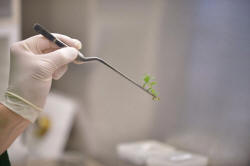Gene-editing startups ignite the next 'Frankenfood'
fight
 Send a link to a friend
Send a link to a friend
 [August 10, 2018]
By Rod Nickel [August 10, 2018]
By Rod Nickel
(Reuters) - In a suburban Minneapolis
laboratory, a tiny company that has never turned a profit is poised to
beat the world's biggest agriculture firms to market with the next
potential breakthrough in genetic engineering - a crop with "edited"
DNA.
Calyxt Inc <CLXT.O>, an eight-year-old firm co-founded by a genetics
professor, altered the genes of a soybean plant to produce healthier oil
using the cutting-edge editing technique rather than conventional
genetic modification.
Seventy-eight farmers planted those soybeans this spring across 17,000
acres in South Dakota and Minnesota, a crop expected to be the first
gene-edited crop to sell commercially, beating out Fortune 500
companies.

Seed development giants such as Monsanto <MON.MX>, Syngenta AG <SYENF.PK>
and DowDuPont Inc <DWDP.N> have dominated genetically modified crop
technology that emerged in the 1990s. But they face a wider field of
competition from start-ups and other smaller competitors because
gene-edited crops have drastically lower development costs and the U.S.
Department of Agriculture (USDA) has decided not to regulate them.
Relatively unknown firms including Calyxt, Cibus, and Benson Hill
Biosystems are already advancing their own gene-edited projects in a
race against Big Ag for dominance of the potentially transformational
technology.
"It's a very exciting time for such a young company," said Calyxt CEO
Federico Tripodi, who oversees 45 people. "The fact a company so small
and nimble can accomplish those things has picked up interest in the
industry."
Gene-editing technology involves targeting specific genes in a single
organism and disrupting those linked to undesirable characteristics or
altering them to make a positive change. Traditional genetic
modification, by contrast, involves transferring a gene from one kind of
organism to another, a process that still does not have full consumer
acceptance.
Gene-editing could mean bigger harvests of crops with a wide array of
desirable traits - better-tasting tomatoes, low-gluten wheat, apples
that don't turn brown, drought-resistant soybeans or potatoes better
suited for cold storage. The advances could also double the $15 billion
global biotechnology seed market within a decade, said analyst Nick
Anderson of investment bank Berenberg.
The USDA has fielded 23 inquiries about whether gene-edited crops need
regulation and decided that none meet its criteria for oversight. That
saves their developers years of time and untold amounts of money
compared to traditional genetically modified crops. Of those 23
organisms, just three were being developed by major agriculture firms.
The newly competitive landscape could foster more partnerships and
licensing deals between big and small firms, along with universities or
other public research institutions, said Monsanto spokeswoman Camille
Lynne Scott. Monsanto - which was recently acquired by Bayer AG <BAYGn.DE>
- invested $100 million in startup Pairwise Plants this year to
accelerate development of gene-edited plants.

North Carolina-based Benson Hill, founded in 2012 and named after two
scientists, mainly licenses crop technology to other companies. But it
decided to produce its own higher-yielding corn plant because of the low
development costs, said Chief Executive Matt Crisp.
Calyxt plans to sell the oil from its gene-edited soybeans to food
companies and has a dozen more gene-edited crops in the pipeline,
including high-fiber wheat and potatoes that stay fresh longer.
Developing and marketing a traditional genetically modified crop might
easily cost $150 million, which only a few large companies can afford,
Crisp said. With gene-editing, that cost might fall as much as 90
percent, he said.
"We're seeing a huge number of organizations interested in
gene-editing," Crisp said, referring to traditional crop-breeding
companies, along with technology firms and food companies. "That speaks
to the power of the technology and how we're at a pivotal point in time
to modernize the food system."
UNCERTAIN REGULATORY, PUBLIC ACCEPTANCE
Supporters of gene-editing say it allows a higher level of precision
than traditional modification.
With CRISPR, one popular type of gene-editing technology used by
Syngenta, scientists transfer an RNA molecule and an enzyme into a crop
cell. When the RNA encounters a targeted strand of DNA inside the cell,
it binds to it and the enzyme creates a break in the cell's DNA. Then,
the cell repairs the broken DNA in ways that disrupt or improve the
gene.
(For a graphic on how the Syngenta process works, see: https://tmsnrt.rs/2KJmtxr
)
[to top of second column] |

A research scientist examines a soybean plantlet in New Brighton,
Minnesota, U.S., November 1, 2016. Courtesy Calyxt/Handout via
REUTERS

Biotech firms hope the technology can avoid the "Frankenfood" label that critics
have pinned on traditional genetically modified crops. But acceptance by
regulators and the public globally remains uncertain.
The Court of Justice of the European Union ruled on July 25 that gene-editing
techniques are subject to regulations governing genetically modified crops.
The ruling will limit gene-editing in Europe to research and make it illegal to
grow commercial crops. The German chemical industry association called the
decision "hostile to progress."
U.S. Agriculture Secretary Sonny Perdue blasted the ruling for enacting
unnecessary barriers to innovation and stigmatizing gene-editing technology by
subjecting it to the EU's "regressive and outdated" regulations governing
genetically modified crops.
The USDA also has no current plans to regulate gene-editing in animal products,
according to a document provided by the agency.
The U.S. Food and Drug Administration, however, plans to regulate gene-editing
in both plants and animals, FDA Commissioner Scott Gottlieb wrote in a June blog
post. The agency is developing an "innovative and nimble" approach to regulating
gene-editing, he wrote, that will aim to ensure its safety for both humans and
animals while allowing companies to bring beneficial products to market.
The USDA, by contrast, chose not to regulate gene-edited crops because the
process typically introduces characteristics that are "indistinguishable" from
those created through traditional plant breeding, which take much longer, USDA
Secretary Perdue said in a March statement.

Although there has been no widespread consumer resistance to gene-editing,
activists who have long opposed genetically modified crops remain suspicious of
any sort of tinkering with DNA. The new technique raises risks of creating
undesired changes in the food supply and warrants increased regulation, said
Lucy Sharratt, coordinator of the Canadian Biotechnology Action Network.
That kind of opposition is why agribusiness giant Cargill Inc [CARG.UL] is
pursuing gene-edited technology with caution, said Randal Giroux, the firm's
vice-president of food safety, quality and regulatory affairs.
Cargill announced in February that it would collaborate with Precision
BioSciences to develop healthier canola oil, but is proceeding slowly on
agreements to store and transport other companies' gene-edited crops pending
clarity from regulators, Giroux said.
"We really do want to see gene-editing evolve in the marketplace," Giroux said.
"We’re watching to see how consumers adopt these products and react to these
products."
SECRET FIELD-TESTING
Other major agriculture biotech firms are moving more aggressively, hoping to
take advantage of lighter regulation to speed development.
A gene-edited crop may take five years to move from development to
commercialization in the United States, compared with a genetically modified
crop that could take 12 years, said Dan Dyer, head of seeds development at
Syngenta.
The firm is working on better-tasting tomatoes that take longer to spoil and
hopes to launch a gene-edited crop in the mid-2020s, said Jeff Rowe, Syngenta's
president of global seeds.

DowDuPont - at a secret location in the U.S. Midwest - is field-testing waxy
corn, a variety grown for industrial purposes that has been edited for higher
yields. The company plans a commercial launch next spring.
Smaller firms will be nipping at the heels of these massive companies in the
race to bring the next generation of genetically engineered foods to market,
said Robert Wager, a biology faculty member at Vancouver Island University.
"The lack of USDA-regulated status is a huge game-changer," he said, "for
universities and small startups to enter the market."
(Reporting by Rod Nickel; Editing by Brian Thevenot)
[© 2018 Thomson Reuters. All rights
reserved.] Copyright 2018 Reuters. All rights reserved. This material may not be published,
broadcast, rewritten or redistributed.
Thompson Reuters is solely responsible for this content. |